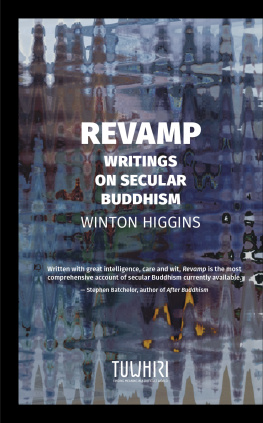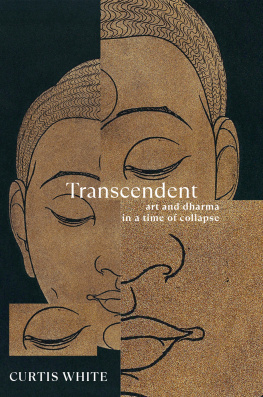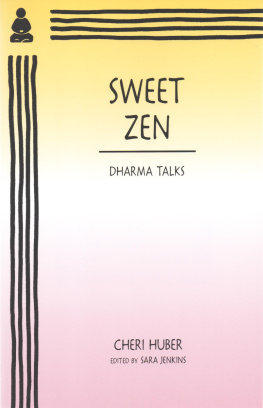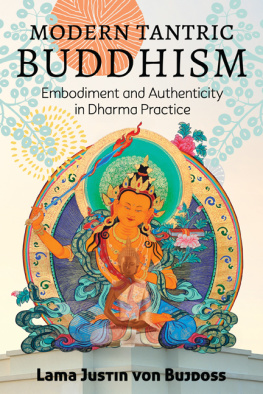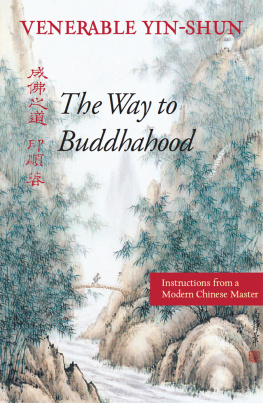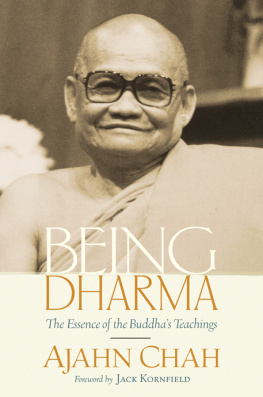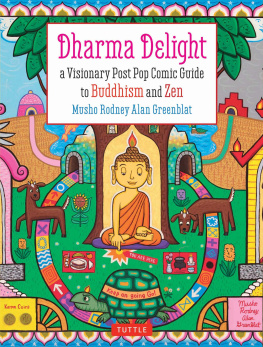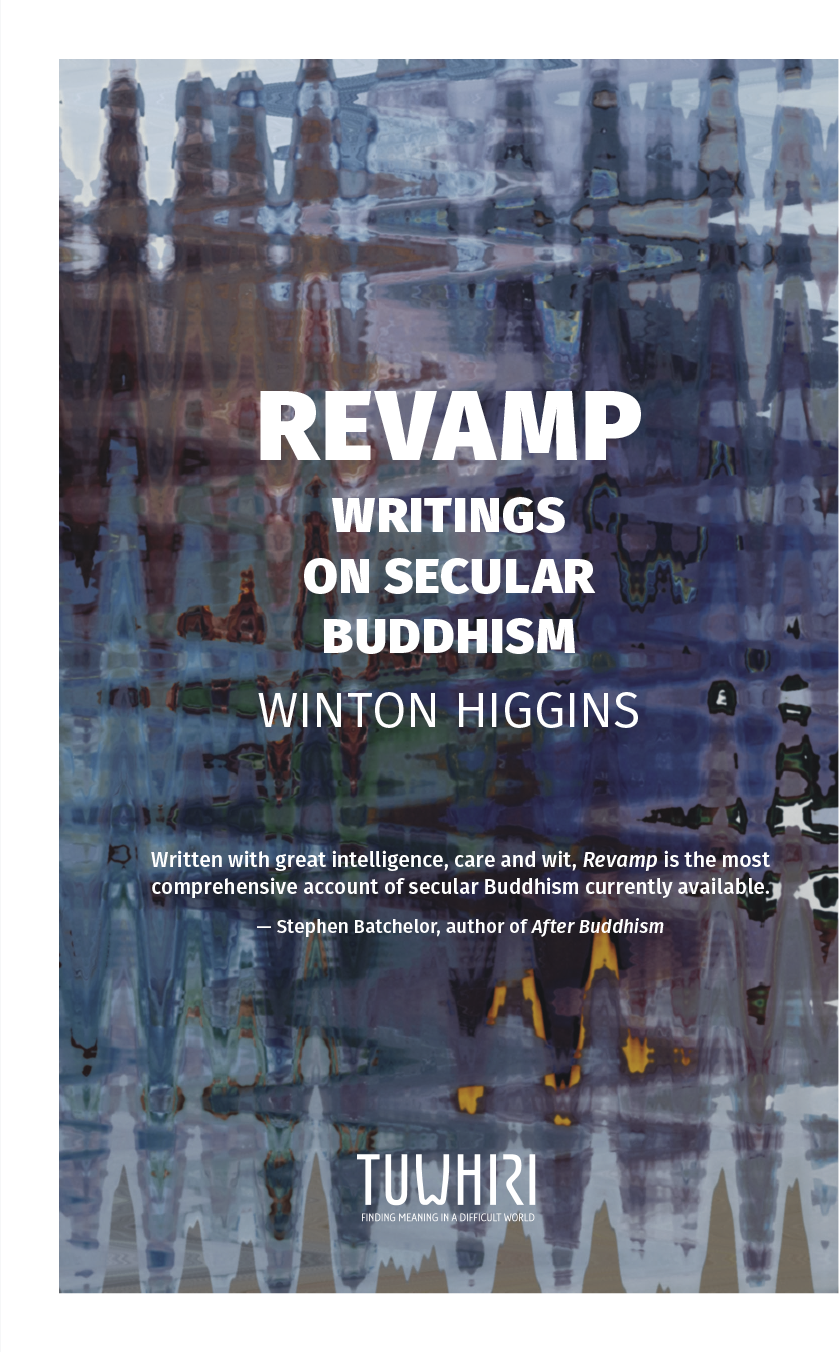Written with great intelligence, care and wit, Revamp is the most comprehensive account of secular Buddhism currently available. Ranging from the transformative inner experience of mindfulness to the social and political challenges of dharmic citizenship, Winton Higgins weaves the many diverse threads of contemporary Buddhist practice into a compelling whole. Revamp is an inspiring example of critical and creative thinking about the most pressing issues facing humanity in our time.
Stephen Batchelor , author of After Buddhism
This book is a welcome read for both secular Buddhist practitioners and those curious about it. The author elucidates the emergence, context and meeting of cultures that secular Buddhism builds on. He presents a fresh and inspiring perspective on mindfulness meditation, offering us choices of how and what to practise. Finally, he invites us to take on the active responsibilities of dharmic citizenship, particularly now when we face the twin crises of global warming and globalised social injustice.
Lorna Edwards , Bodhi College participant,
Secular Buddhist Network team member, Cymru Wales
Winton Higgins has played a crucial role in helping us to understand the meaning and value of a secular dharma. The essays collected in Revamp reveal his unmatched ability to provide us with a lucid, nuanced account of the historical roots and key philosophical ideas of secular Buddhism. At the same time, the author insightfully explores the essential practices which promote human flourishing in this world: a non-formulaic approach to insight meditation, the creation of democratic communities of practitioners, and progressive political activism to confront the two great challenges of climate change and economic injustice.
Mike Slott , editor of the Secular Buddhist Network website, New York
It is a pleasure to go on a journey with Winton Higgins from the roots of secular Buddhism as a synthesis of western philosophical influences and Asian Buddhism, to the necessary pragmatic process of change in traditional Buddhism towards a useful, liveable, and valuable Buddhism for present-day people in modern societies. Winton encourages us to get on the path to become the person we want to be, to tackle the ills in our society, and to strengthen values that already exist. Instead of absolute truths, it is the four tasks of daily life that guide us.
Saskia Graf , meditation teacher,
Buddha-Stiftung fr skularen Buddhismus, Heidelberg
Winton Higginss book, Revamp , offers a captivating and pragmatic discussion of the emergence of secular Buddhism in the west. Winton weaves together early Buddhist texts, with contemporary influences by scholars, novelists and in particular Stephen Batchelors work, which he builds on in thoughtful and insightful ways. As an experienced teacher and practitioner, Winton addresses critical issues of understandings and of practice, tackling for example the limiting effects of celibate monasticism and gender politics. A most engaging book for readers looking to live a secular Buddhist path with authenticity and creativity.
Suzanne Franzway , secular dharma practitioner
and emeritus professor of gender studies, Adelaide, South Australia
Revamp is a short book of incredible depth and insight into secular Buddhism, one that not only tracks the movements past along wider cultural and social currents, but also provides pointers to its exciting future. Finally, Revamp meets the challenge introducing people to secular Buddhism in a way that is accessible, understandable, and requires no previous knowledge of traditional Buddhism.
Alex Carr, One Mindful Breath, Wellington, Aotearoa New Zealand
Though making careful connections with western and eastern philosophy and psychology, Winton Higgins continually challenges dearly held views that have underpinned much of western Buddhism. Throughout this book Winton reframes and finds new words for the four tasks as the kernel of the Buddhas teaching. Each time he languages the tasks a bit differently, I become more resonant with the path I tread. If, like myself, you are not scholarly hang in there! Reading this book takes effort, but its well worth it. Wintons words are nectar to my heart and mind: I will read them often.
Nelly Kaufer, lead teacher, Pine Street Sangha, Portland, Oregon
Also by Winton Higgins
Love death chariot of fire (2020)
After Buddhism, a workbook (2018)
Rule of law (2016)
The magnitude of genocide with Colin Tatz (2016)
Politics against pessimism with Geoff Dow (2013)
Engine of change (2005)
Journey into darkness (2003)

Revamp
writings on secular Buddhism
Winton Higgins

Wellington
Aotearoa New Zealand
In memoriam Ernst Wigforss 18811977
First edition April 2021
Published by
The Tuwhiri Project
PO Box 6626
Wellington 6141
Aotearoa New Zealand
www.tuwhiri.nz
Copyright Winton Higgins
This work is licensed under a Creative Commons Attribution
Non-Commercial-ShareAlike 4.0 International License
Winton Higgins has waived royalty payments for this book.
All proceeds will go to The Tuwhiri Project.
ISBN 978-0-473-57140-5
A catalogue record for this book is available from the
National Library of New Zealand
Kei te ptengi raraunga o Te Puna Mtauranga o Aotearoa
te whakarrangi o tnei pukapuka
Design John Houston
Cover by minimum graphics
Set in Fira Sans and IBM Plex Serif
10 9 8 7 6 5 4 3 2 1

Contents

Introduction
The term secular Buddhism has appeared only in recent years, but it provides a rubric under which we can group certain spontaneous developments among some Buddhist practice groups and teachers in the west over the last four decades. Its doctrinal roots go back even further.
Most Buddhist practitioners in western countries belong to Asian diasporas and preserve the beliefs and practices of their countries of origin. The next most numerous group of practitioners consists of ethnic westerners who have adopted or adapted longstanding Asian forms of practice, with their associated rituals, beliefs and organisational culture (including discriminatory gender relations, monasticism, hierarchy, and concepts of authority). This group includes disillusioned Christians in search of an alternative religion. Neither of these groupings is secular. They tend to close ranks and hold themselves out as representing Buddhism-as-such while practising it as a religion like any other.
The third, emerging category of Buddhist practitioners in the west encompasses those who seek to develop forms of practice, community and thought that chime with their own culture and its progressive values starting with egalitarianism, inclusiveness and democratic self-rule. Their project exemplifies what Seyla Benhabib has called the flexible appropriation of tradition.
Its this third group which attracts the secular Buddhism label. Prominent in its ranks are those with no prior religious affiliation or interest, including people initially drawn to Buddhism after a positive experience of mindfulness-based psychotherapy or personal training. Rather than looking for an alternative religion, theyre seeking a practical philosophy in the ancient Greek sense a set of ideas to practise and live by. Though religious Buddhists tend to see them as beyond the pale, secular Buddhists find their starting point in the ethics and matrix of concepts enunciated by Gotama (c. 480400 BCE), the historical Buddha. Throughout the Buddhist world, this legacy is called the dharma.

